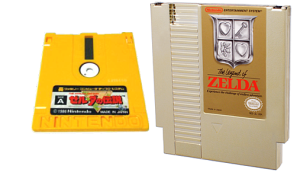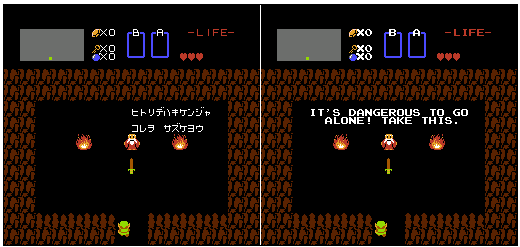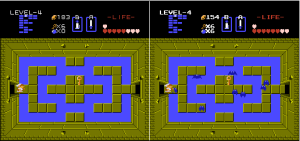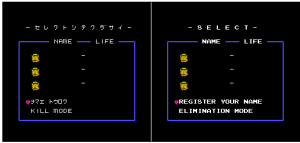Zelda Dungeon Exclusive Interview with Legends of Localization Creator Clyde “Tomato” Mandelin
Posted on September 13 2015 by Kassye Butler
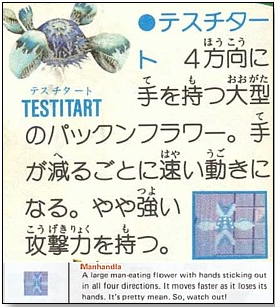
Do you remember your first Zelda game? For most of us born in the 80’s it was the original Zelda of Legend for the NES. We were dropped into a vast field with nothing but the game’s instruction manual to guide us. We went on an adventure through Hyrule, and took all in all of the lore as it was given us. But have you ever wondered just what might have been lost in translation? As children it probably didn’t occur to us that this wonderful game started in another country, but as we grew older and the world became smaller, some have started to wonder if maybe the old man really did tell Link “It’s dangerous to go alone, take this!”
Well, professional translator Clyde Mandelin has wondered that exact same thing, and has taken the Famicon version of The Legend of Zelda apart with a fine tooth comb. He has used his knowledge of the Japanese language and culture and applied it to the Japanese version of the game, comparing how he would translate the dialogue to how it was commercially localized. He calls this project Legends of Localization. Until now, this project has only been available online, but soon will be available to purchase in book form! Hit the jump to find out more, and read our exclusive interview with the man himself, Clyde Mandelin, as he talks about his journey into translating The Legend of Zelda for the Famicon and organizing his work into a wonderful book that is a must for any Zelda fan!
1. What interested you in Zelda I? (The story of you playing this game as
a child is so wonderful!)
The NES was still very new and I had never heard of it before, so when I
encountered it it was the most delightful surprise I’d ever had in video
games. I had really only played Atari 400 games before then, so I had
been perfectly content with simple games with chunky graphics, single
screens, black backgrounds, and beep-boops. Along comes this EPIC game
with amazing music, terrific graphics, hundreds of screens, multiple
dungeons, and secrets everywhere… I wish I could go back in time and
see my first reaction to Zelda.
Our school brought in a bus full of NESes every so often, which is how I
first encountered Zelda. As soon as I saw the game, I knew I needed it.
I didn’t even have the system, but I needed the game. Luckily, my
parents gave in to my non-stop pestering… And now that I think about
it, if they hadn’t my life would be pretty different today!
The first Zelda game became one of the foundations of my gaming
memories. I shared so many Zelda experiences with my friends and
classmates back then, and those memories actually define the NES era for
me. Somehow, by a crazy quirk of circumstances, Zelda 1 was always a
part of my life well into my teens and beyond. Even as an adult, I wound
up married to a bigger Zelda nerd than me… and now I’m writing a Zelda
book with her. The game’s in my blood at this point!
*****
2. How hard/easy was it for you to secure a Japanese copy of the game?
It wasn’t too difficult to get a Japanese copy of the game – there are
always plenty on eBay, and even more on Yahoo Auctions Japan and
Rakuten. The problem usually boiled down to price… but my friends at
Fangamer have been helping me get things I need for my work. I’ve also
been trying to gather the Japanese games and other related materials
that are in the best possible condition, which does make things more
difficult.
*****
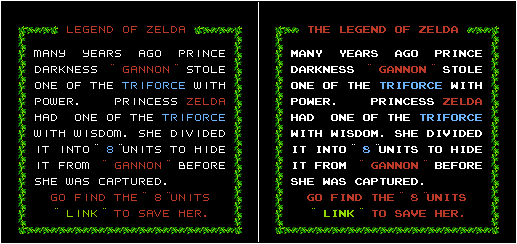
3. Thoughts on how the opening description works? (The fact that it is in
English in both versions)
English is literally a part of the Japanese language, and English is
taught as a mandatory subject in Japanese schools. So it’s pretty normal
to see loads of English text in Japanese stuff. It’s especially common
in retro games because of technical limitations and ease-of-use issues.
In fact, whereas we see Japanese games with bad English writing (such as
“A winner is you!”) as having a retro vibe, all-English text like what’s
found in the Zelda 1 intro scroll is considered very “retro” by Japanese
gamers.
*****
4. Any translations that stand out to you and make this journey memorable?
Since there’s only a few dozen lines of text in Zelda 1, I actually go
into detail and compare every Japanese line with the English
translation. I explore what’s the same, what’s been changed, what’s
missing, and what’s been incorrectly translated. Then I try to explain
why certain changes might’ve happened, what effect any changes had on
the intended meaning, and what these changes caused for future games.
I especially go into detail with the more famous lines of text, like
“Let’s play money making game” and “It’s a secret to everybody.”
Sometimes, even when it seems like a translation is correct, there might
be underlying implications that are more obvious in one language than
another. For example, the Moblins that tell you “It’s a secret to
everybody” might actually be begging for their lives – something I had
never even considered as a kid.
I go into great depth on the different weaknesses the Pols Voice enemies
have – in all the English versions you can just kill them with arrows,
but the Japanese releases rely on the microphone in Controller 2…
except that mechanic changes in all of the different ports!
I also briefly delve into the newer translation of the game and compare
it with the original translation. Similarly, I take a quick look at some
of the text that appears in a prototype version of the Japanese release.
For example, the “It’s a secret to everybody” line literally IS a Moblin
begging for his life!
*****
5. Why did you decide to make this into book form?
I’ve been comparing Japanese games with their localizations for about 16
years now, but it was only really a hobby all that time. I’m a
professional translator and all, so I’m happy to translate and localize
things into English on a daily basis. What’s cool is that turning my
comparisons into a book lets me combine my career with my hobby in a way
that’s different from my normal work – now I get to show how the process
works and how it’s worked in the past!
This Zelda book is actually my very first step in making Legends of
Localization books. My hope is that it’ll set the bar for future ones if
it does well. I’m actually terrible with art and design, so I’m working
with a friend named Tony at Fangamer who specializes in this sort of
field. The book’s layout so far is looking amazing.
*****
6. How much time/dedication/funds is it taking for you to complete this
project?
I’d already documented most of the content for the online version years
ago, but I’ve been redoing almost everything from scratch. I actually
started a Zelda 1 and 2 compilation book earlier in the year, but the
Zelda 2 content was getting so hefty that we had to break them into
separate books. Now that the Zelda 1 book is nearing completion, I’m
already shocked at how big this one is turning out!
There’s basically a team of four people making this happen – me, my
wife, Tony, and Reid, the head of Fangamer. Between us, we’re definitely
in the thousands of hours. Money-wise, it’s a little harder to calculate
since I’m buying some of the stuff myself while others at Fangamer are
getting their own stuff, but I’ve spent a few hundred dollars on
materials so far, so I’d estimate Fangamer has spent much more. We’re
gathering not just the games, but related materials and merchandise too
– even obscure Japanese magazines from the 80s!
*****
7. What extra measures have you done for this project?

I think the biggest step is that I’ve rewritten most of the content from
scratch. I’ve also researched many new topics, fixed mistakes in the old
content, and even added in lots of comparison to the newer Zelda
translations. I own so many Japanese and English versions of Zelda that
I’ve seriously lost count!
The team has also been buying a lot of Zelda merchandise that’s relevant
to the book. Some of it is for photo purposes – we wanted to have our
own high-quality photos for the book rather than have a bunch of
low-quality photos from all over the place. Some of the merchandise is
for research too, like magazines, advertisements, and flyers.
The rarest thing we bought was probably the Japanese Zelda board game.
We’re actually planning on streaming us play it sometime, and the
viewers will get to play as a player or two!
The thing is, we only need most of this expensive Zelda merchandise for
a short time. So when we’re done, we’re considering selling it or
auctioning off some of it for charity. We haven’t made any definite
plans yet, though. You know, maybe the Zelda board game stream would be
perfect for a charity event!
*****
8. When can we expect pre-orders and release dates, also any final pricing?
We’re still finishing the book, so pre-orders aren’t open yet. You can
sign up to be notified when pre-orders are open, though!
Fangamer is handling the production/sales side of things, but it sounds
like they’re aiming for a November or December 2015 release. I assume
pre-orders will open in October or so. That’s just my rough guess,
though – I don’t actually work there.
We’re considering a bunch of bonuses for people who pre-order this
Legends of Localization book and future ones too! They’re not set in
stone, but the current Legends of Localization bonuses we have in mind are:
– A special bookmark, unique to each Legends of Localization book –
only available through pre-order
– Autographs from everyone on the team – only available through pre-order
– A small booklet with a game-specific dictionary so players can try
to play the Japanese versions of these games themselves! These booklets
will also contain other simple tools for players wanting to learn
Japanese, as well as other similar content. Right now we’re calling
these booklets “passports”, so they might have a neat passport theme to
them. These might not be pre-order exclusive, but they’ll probably be
free with pre-orders!
We’re currently considering doing all of our Legends of Localization
books with hard covers, dust jackets, and possibly foil embossing.
Basically, we’re trying to go high-class with the Legends of
Localization series. If you’ve ever seen Fangamer’s Mother 3 Handbook,
it’ll be getting a similar treatment.
The final price is up to Fangamer, but it should be comparable to their
other books. I assume the price will ultimately depend on how big the
book ends up being. I’ve also asked if a digital version is possible,
and it sounds very doable, so that’ll hopefully be another option as
well. And, of course, there’s the old website version that’s been online
for years now for free!
*****
This is all so very exciting! Is there anything else you would like to add?
I originally started my Legends of Localization site in 2010 or so,
during a rough period in my career. My translation work was drying up,
and I was having trouble finding more work for a while. So, once things
became a little more stable, I figured I should put my passion online to
help get my name out there – it could help me avoid avoid future rough
patches, you know? That’s how my Legends of Localization site started –
I thought it would be a neat little thing for fellow gamers and
translators to enjoy, but its popularity exploded right away! It’s crazy
to think that those hard times actually led to this opportunity years
later. I’m super grateful to have this chance now.
Because she is so instrumental with this project, we have asked Clyde’s wonderful wife, who goes by Poe, to give us her thoughts on Zelda and the Legends of Localization book.
Why Zelda?
I’ve been a Zelda fan all my life and I pride myself on all the obscure
Zelda trivia that I’ve picked up over the years. A Link to the Past was
actually my first Zelda game (and also my favorite 2D game), so I didn’t
grow up with the original Zelda. Working on the book with Mato gave me a
brand new appreciation for Zelda’s simple beginnings. I learned a lot
that I never would have known had I just played the game and forgotten
about it.
How has your experience with this project been?

This project started out as a Zelda 1 & 2 localization book, so I
reluctantly did a ton of research on Zelda 2. I say “reluctantly”
because Zelda 2 was my least-favorite Zelda game. In doing the research,
I discovered that there’s a lot of depth to Zelda 2, especially in the
backstory, and I like the game a lot more now. So I think that digging
into the localizations like this really adds to the experience.
We had to break the books up into two volumes because the info we were
gathering was too much for a single book, so the Zelda 2 book will be
coming later on!
What was the best part of this project for you?
My favorite part about working on the Zelda 1 book has been gathering
rare and obscure merchandise and taking photos of everything. We didn’t
want to steal anything off Google Images, so we bought everything legit
and are using our own new photography for the book. My favorite piece of
merchandise is the super rare Japanese board game for Zelda 1. I’ve
always dreamed of owning that board game, and thanks to this project, I
get to see it with my own eyes (and possibly play it!).
If you’re a Zelda fan, even if you don’t really like the first game, I
think you’ll find this book fascinating.
*****
So many exciting things going on! I know I will be pre-ordering this as soon as possible. If you would like to keep up with Tomato through this and other projects he is working on you can go:
Legends of Localization
Twitter
Twtich
Youtube
What do you guys think? Do you plan on picking up this book when it comes out? What other titles would you like to see localizations for? Let us know in the comments below!
26 year old mother of 2 future gamers. Currently pursuing a degree in Business Administration with a focus in Accounting at Henderson Community College in Henderson, KY




